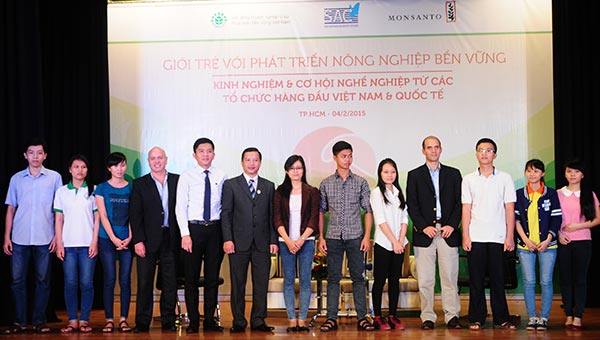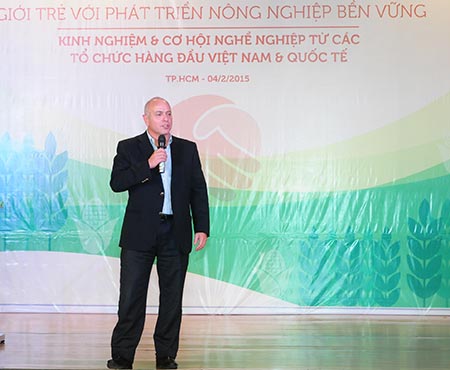Sustainable agriculture: a smart choice to feed world population

The question of how the world can produce enough food in 2050 with the current arable area was discussed by agricultural experts and students at a seminar on Wednesday at Ho Chi Minh City Students’ Cultural Palace, co-organised by the Ho Chi Minh City Student Assistance Centre and Vietnam Business Council for Sustainable Development.
By 2050 there would be an additional two billion people – taking the global population to nine billion - leading to the increased demand for food, Juan Ferreira, vice president of Monsanto, said when talking about the importance of sustainable agriculture at the seminar.
The world’s farmers face the huge challenge of producing in 50 years the same amount of food humans grew in the previous 10,000 years combined, and the land available is inadequate unless forests are destroyed, according to Ferreira.
Food insecurity is a problem even in the US, whose farmers are among the most productive in the world. Thus, the only option is to grow more food on the same land they have, or sustainable agriculture, which enables farmers to produce more yet conserve resources.

“With technologies, agriculture is much different to what it was hundreds of years ago. Technology helps agriculture develop sustainably by using the same or less water and nitrogen and get more yields,” he said “Vietnam will be the main market for the company in the upcoming years and there will be more investment in the country in future. In Vietnam, we see very large potential.”
Monsanto is collaborating with farmers to restructure agriculture in Vietnam and plant corn and other crops on less productive rice fields. As part of government policies, a programme involving Monsanto called “Rice-to-Corn Rotation” uses better seeds, farming practices and market linkages to help 8,000 farmers in the Mekong Delta triple the income they earned from rice. The company is also promoting its Products - Practices – Partnerships model. The model, also adopted by Ecofarm and other firms, involves four stakeholders – the state, enterprises, scientists and farmers, and aims to improve farmers' productivity and income.
Agricultural power
Most of the participants at the seminar agreed that Vietnam had huge potential in agriculture. The sector, which contributes more than 20 per cent of the country’s GDP and employs 50 per cent of the work force, will continue to spearhead the nation’s economic growth.
“There is very good vision from the government on sustainable agriculture, engaging many stakeholders to help develop Vietnam’s agriculture,” Ferreira said. “The government’s commitment to developing agriculture plays a very important part.”
Asked if Vietnam can become an agricultural power, he agreed wholeheartedly, saying the country has a combination of good soil, good governance, policies, and appetite for investment, which allows the entry of latest technologies. “This can help Vietnam become a powerful country in agriculture.”
Vietnam imports $2 billion worth of corn every year, but he said through the use of technology, knowledge and partnership, the country would be able to produce that amount of corn in future.
Youth power
To become an agricultural power, Vietnam’s agricultural sector needs talented, goal-driven and passionate youth. Engaging and equipping young people with the right mindset and skills are an important part of Vietnam’s efforts to develop agriculture.
At the seminar three hundred local students on agriculture and sustainability learned about the challenges facing agriculture – growing population, increasing demand for food and depleting natural resources. They learned about the important role young people can play in developing sustainable agriculture. They also got an insight into how non-agricultural students would have a significant role in agribusiness and compete in the global economy, particularly in food and agriculture.
Tran Ngoc Quynh, a third-year student at the Ho Chi Minh City University of Natural Sciences, who studies bio-technology, said he had no idea about sustainable agriculture at high school and had thought farming was a hard job. Lectures in university totally changed his concept of agriculture, he said. Though a student of bio-technology, after graduation he plans to set up his own small farm where he can apply advanced technologies.
What the stars mean:
★ Poor ★ ★ Promising ★★★ Good ★★★★ Very good ★★★★★ Exceptional
Latest News
More News
- Congratulations from VFF Central Committee's int’l partners to 14th National Party Congress (January 25, 2026 | 09:46)
- List of newly-elected members of 14th Political Bureau announced (January 23, 2026 | 16:27)
- 14th Party Central Committee unanimously elects To Lam as General Secretary (January 23, 2026 | 16:22)
- List of members of 14th Party Central Committee announced (January 23, 2026 | 09:12)
- Highlights of fourth working day of 14th National Party Congress (January 23, 2026 | 09:06)
- Press provides timely, accurate coverage of 14th National Party Congress (January 22, 2026 | 09:49)
- Press release on second working day of 14th National Party Congress (January 22, 2026 | 09:19)
- Minister sets out key directions to promote intrinsic strength of Vietnamese culture (January 22, 2026 | 09:16)
- 14th National Party Congress: Renewed momentum for OVs to contribute to homeland (January 21, 2026 | 09:49)
- Party Congress building momentum for a new era of national growth (January 20, 2026 | 15:00)
















 Mobile Version
Mobile Version